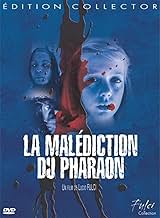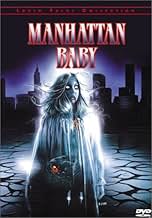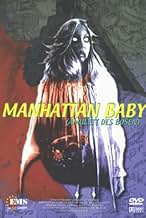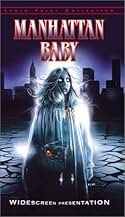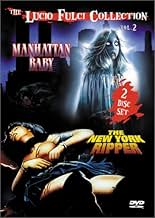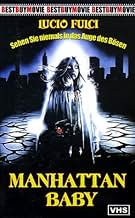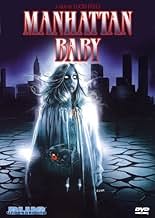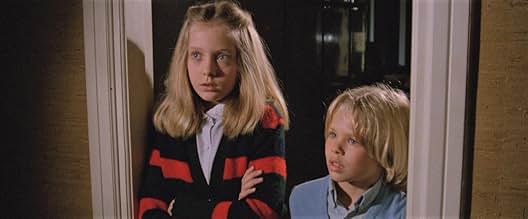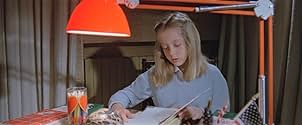IMDb-BEWERTUNG
4,8/10
3550
IHRE BEWERTUNG
Ein Archäologe öffnet ein ägyptisches Grab und setzt versehentlich einen bösen Geist frei. Seine junge Tochter wird von dem befreiten Wesen besessen, und als sie nach New York zurückkehrt, b... Alles lesenEin Archäologe öffnet ein ägyptisches Grab und setzt versehentlich einen bösen Geist frei. Seine junge Tochter wird von dem befreiten Wesen besessen, und als sie nach New York zurückkehrt, beginnen die blutigen Morde.Ein Archäologe öffnet ein ägyptisches Grab und setzt versehentlich einen bösen Geist frei. Seine junge Tochter wird von dem befreiten Wesen besessen, und als sie nach New York zurückkehrt, beginnen die blutigen Morde.
Laura Lenzi
- Emily Hacker
- (as Martha Taylor)
Cosimo Cinieri
- Adrian Mercato
- (as Laurence Welles)
Enzo Marino Bellanich
- Wiler
- (as Vincenzo Bellanich)
Tonino Pulci
- Orderly
- (as Antonie Pulci)
Martin Sorrentino
- Caretaker
- (Nicht genannt)
Empfohlene Bewertungen
On a trip to Egypt with her archaeologist father, Professor George Hacker (Christopher Connelly) and photographer mother, Emily (Laura Lenzi), young Suzie (Brigitta Boccoli) begins having bizarre experiences involving things of a mystical nature. With her parents too busy to notice, Suzie encounters a strange person who gives her a very distinctive amulet. Meanwhile, dad has an Indiana Jones-style adventure of his own, getting blinded in the process.
Back home in NYC, it's back to life as usual.
Oh no!
Suzie's new amulet has its own spooky theme music! This can mean only one thing! Yes indeed, she's become the tool of some peevish supernatural entity! It's not long before all manner of weirdness breaks out.
MANHATTAN BABY is another of Director Lucio Fulci's supernatural horror offerings. As such, it's pretty solid, featuring some of his signature gruesomeness and eyeball closeups. The novel story has a few nice twists and ideas.
BEST BITS: #1- Death by elevator! Not in the usual manner! #2- The overdue demise of Emily's utterly annoying, "wacky glasses"-wearing, imbecilic coworker, Luke (Carlo De Mejo)! #3- Snake-cam / death by cobra! #4- "Poor Jamie Lee!" #5- Dead bird attack! Fishing line holding up the birds? You didn't see annnything!...
Back home in NYC, it's back to life as usual.
Oh no!
Suzie's new amulet has its own spooky theme music! This can mean only one thing! Yes indeed, she's become the tool of some peevish supernatural entity! It's not long before all manner of weirdness breaks out.
MANHATTAN BABY is another of Director Lucio Fulci's supernatural horror offerings. As such, it's pretty solid, featuring some of his signature gruesomeness and eyeball closeups. The novel story has a few nice twists and ideas.
BEST BITS: #1- Death by elevator! Not in the usual manner! #2- The overdue demise of Emily's utterly annoying, "wacky glasses"-wearing, imbecilic coworker, Luke (Carlo De Mejo)! #3- Snake-cam / death by cobra! #4- "Poor Jamie Lee!" #5- Dead bird attack! Fishing line holding up the birds? You didn't see annnything!...
If you have some acquaintance with other Fulci films, especially the ones from the so-called "Gates of Hell Trilogy", then you know that eyes are, to say at least, a repetitive motive, from the gore set pieces, like the nail killing in "L'aldilà" (eng: The Beyond), to the many eye close-up shots in the dialogue scenes of "Manhattan Baby". Against this general background, this movie can be regarded as a key film. Here, Fulci is somewhat presenting in a very explicit way the coding of the eyes (and The Eye) in his own cinematic style.
While travelling in Egypt with his mother and his archeologist father, a girl receives an ancient medallion representing an eye (very similar to the Eye of Horus) from a mysterious white-eyed woman that then disappears in the air (literally). Almost at the same time, her father is blinded by the same eye-shaped symbol, only this one is carved in the wall of an underground tomb inside a forbidden pyramid. The family goes back to New York and there the medallion starts to exert its influence, taking control over the girl, triggering supernatural events in the family's apartment and opening a portal to another space-time dimension.
The medallion is the divine Eye (its link with divinity is explicitly mentioned in the film), an access to the world of The Beyond. The blind woman that gives the medallion to the girl has white-veiled eyes, just like the blind young woman with the dog and the main characters at the end of "L'aldilà". We know, from this last movie, what these white eyes can mean in the Fulci code: vision-knowledge of the other side, and the ability to move between that place and this human dimension. But we also have the fragile human eyes (e.g. the eyes of the father) and mundane blindness: the inability to see and to understand.
On a more stylistic level, we have all the already mentioned eye close-up shots during dialogues. The tension, the real intensity is always happening at the level of looks in Fulci and almost never at the level of words. Language is often banal and stereotyped in this film, as in many others by this director. Characters in the worldly sphere also tend to be very one-dimensional: the father is the scientist, the man of reason, the babysitter is the beautiful and lively girl, the parapsychologist is the somewhat sinister and dark man surrounded by antiques and stuffed birds, etc. And then there's that simple and repetitive sax score during many of the urban sequences, an almost vulgar soundtrack that is in violent contrast with the fantastic chaos raised by the medallion. It is Fulci's violent cut between the worlds, the one that seem to disconcert many viewers and that is also violently translated to cinematic form by this director. The cut between an abysmally stereotyped everyday human world, the world of frightened and fragile human eyes and the powerful world of The Eye that lies Beyond.
While travelling in Egypt with his mother and his archeologist father, a girl receives an ancient medallion representing an eye (very similar to the Eye of Horus) from a mysterious white-eyed woman that then disappears in the air (literally). Almost at the same time, her father is blinded by the same eye-shaped symbol, only this one is carved in the wall of an underground tomb inside a forbidden pyramid. The family goes back to New York and there the medallion starts to exert its influence, taking control over the girl, triggering supernatural events in the family's apartment and opening a portal to another space-time dimension.
The medallion is the divine Eye (its link with divinity is explicitly mentioned in the film), an access to the world of The Beyond. The blind woman that gives the medallion to the girl has white-veiled eyes, just like the blind young woman with the dog and the main characters at the end of "L'aldilà". We know, from this last movie, what these white eyes can mean in the Fulci code: vision-knowledge of the other side, and the ability to move between that place and this human dimension. But we also have the fragile human eyes (e.g. the eyes of the father) and mundane blindness: the inability to see and to understand.
On a more stylistic level, we have all the already mentioned eye close-up shots during dialogues. The tension, the real intensity is always happening at the level of looks in Fulci and almost never at the level of words. Language is often banal and stereotyped in this film, as in many others by this director. Characters in the worldly sphere also tend to be very one-dimensional: the father is the scientist, the man of reason, the babysitter is the beautiful and lively girl, the parapsychologist is the somewhat sinister and dark man surrounded by antiques and stuffed birds, etc. And then there's that simple and repetitive sax score during many of the urban sequences, an almost vulgar soundtrack that is in violent contrast with the fantastic chaos raised by the medallion. It is Fulci's violent cut between the worlds, the one that seem to disconcert many viewers and that is also violently translated to cinematic form by this director. The cut between an abysmally stereotyped everyday human world, the world of frightened and fragile human eyes and the powerful world of The Eye that lies Beyond.
Hey - it's 1980 and Mr. Fulci wishes to do something 'not so horror'. So he created this tale about an Egyptian amulet which brings terrible tragedy to a New York family. I've seen about 15 of these Italian post-giallo horrors now from Fulci, Bava and of course, Argento. I found this one to be relatively well-dubbed and paced. In other words, the pace wasn't infintessimal and the actors didn't break from Italian into dubbed English and vice versa. For all I know, this was recorded in English given its title. Anyway, the two children in the film are strikingly eerie, remniscent of Village of the Damned's little miscreants, though the boy's voice seems very off (the only exception to my comment about the dubbing)- check out his first few lines in the park in "Manhattan"! Hilarious! The plot, while somewhat draggy as all of these films are (other societies don't demand a new scene every 2.5 minutes and either dialogue or action at all times it seems), it's not that slow. Of course these films are often watched for the unflinching depictions of gore that Italians are not afraid to deliver, and while the violence is a bit more subtle in this one than most, there are three scenes which will satisfy this type of viewer. Ultimately, this film's worst trait is its attempt at more 'psychological' horror in my opinion. However, it is not bad - as long as you are used to these Italians and their significantly different motivations and backgrounds from American directors. Oh, and as you might expect from Fulci, the cinematography is spellbinding at times.
'Manhattan Baby' is second rate Fulci. People who love/hate Fulci's work usually mention two things - his nonsensical plots and his abundance of gore. Unfortunately this movie has plenty of the former and hardly any of the latter, making it pretty dull and hard going viewing for the most part. It was co-written by regular Fulci collaborator Dardano Sacchetti (who also worked with just about every important Italian horror/exploitation director - Mario and Lamberto Bava, Argento, Lenzi, Deodato,etc.) Sacchetti says that the producers slashed the budget at the last minute, which undoubtedly contributed to making this a poorer movie, but it's hard to know who to blame. The script is certainly very muddled so the viewer has to battle to work out just what is going on half the time, and Fulci himself seems to have deliberately left out his trademark gore. There's only really one notable gore sequence towards the climax of the picture, and while it's pretty good, it's a long time coming, and hardly up to the standards set by Fulci's horror masterpiece 'The Beyond'. Fulci's best movie for my money wasn't even horror it's the giallo 'Don't Torture A Duckling'. That movie had virtually no gore or effects but it had an interesting story and some good actors, neither of which 'Manhattan Baby' has. I wouldn't say 'Manhattan Baby' is a complete stinker, as there are a few effective sequences, but it's extremely disappointing overall, and easily the weakest Fulci movie I've seen to date. Unless you're a die-hard obsessive Italian horror fan, give it a miss.
Manhattan Baby is Fulci's dive into beautiful imagery. There's some scenes in this one that are genuinely breathtaking.
A medallion from an archaeological dig leaves a man blind. And a family falls into jeopardy after their son disappears into thin air, and their daughter is possessed by an ancient demon.
If the budget hadn't been cut for the film, I would imagine that this would be Fulci's most memorable film. People would think 'Manhattan Baby' instead of 'Zombie' when they heard the name Lucio Fulci.
Most horror fans haven't seen this one. It's true that MB isn't a film that succumbs to everyone's tastes. This is simply because in most Italian films, it's usually style over substance, which in some cases can leave an unseasoned viewer in total awe at the apparent inept plot line before them.
In Italian films (especially), you have to pay very close attention to the whole film. Certain plot definers aren't given 'camera-attention' at crucial times at any given time through any given film. in American films, the camera tells the story. The same can be said for Italian cinema, but a lot of times, it's much more subtle in its delivery and can leave one feeling incomplete until they eventually see it again.
Anyway, should you watch Manhattan Baby? Sure. I'll recommend it. It's a beautifully shot film with hardly any of that Fulci gore we all expected. It also has a great Gothic score that adds tons of surrealistic atmosphere that pulls you in for the most part.
Not a film for everyone, but the guru's of the cinema world will find a lot of redeeming qualities to talk about.
A medallion from an archaeological dig leaves a man blind. And a family falls into jeopardy after their son disappears into thin air, and their daughter is possessed by an ancient demon.
If the budget hadn't been cut for the film, I would imagine that this would be Fulci's most memorable film. People would think 'Manhattan Baby' instead of 'Zombie' when they heard the name Lucio Fulci.
Most horror fans haven't seen this one. It's true that MB isn't a film that succumbs to everyone's tastes. This is simply because in most Italian films, it's usually style over substance, which in some cases can leave an unseasoned viewer in total awe at the apparent inept plot line before them.
In Italian films (especially), you have to pay very close attention to the whole film. Certain plot definers aren't given 'camera-attention' at crucial times at any given time through any given film. in American films, the camera tells the story. The same can be said for Italian cinema, but a lot of times, it's much more subtle in its delivery and can leave one feeling incomplete until they eventually see it again.
Anyway, should you watch Manhattan Baby? Sure. I'll recommend it. It's a beautifully shot film with hardly any of that Fulci gore we all expected. It also has a great Gothic score that adds tons of surrealistic atmosphere that pulls you in for the most part.
Not a film for everyone, but the guru's of the cinema world will find a lot of redeeming qualities to talk about.
Wusstest du schon
- WissenswertesThe name of the character Adrian Marcato is borrowed from Rosemaries Baby (1968). The title "Manhattan Baby" was also derived from the title of the Polanski film, despite Director Lucio Fulci hating the title, and Screenwriter Dardano Sacchetti preferring his title "The Evil Eye". That version of the title was reworked in the US to " Eye of the Evil Dead", deriving from Sam Raimi's classic "The Evil Dead". Raimi was at first irritated, but learned Fulci's background with having no leverage over distribution decisions, and more or less felt bad for him and took no legal action.
- PatzerReflected in the archaeologist's big sunglasses when we see him in his office in New York near the beginning of the film.
- Alternative VersionenThe Anchor Bay release under the original title "Manhattan Baby" is the complete, uncut version, containing all the gore and violence.
- VerbindungenFeatured in Beyond the Living Dead (2001)
Top-Auswahl
Melde dich zum Bewerten an und greife auf die Watchlist für personalisierte Empfehlungen zu.
- How long is Manhattan Baby?Powered by Alexa
Details
Box Office
- Budget
- 300.000 $ (geschätzt)
- Laufzeit1 Stunde 29 Minuten
- Sound-Mix
- Seitenverhältnis
- 2.35 : 1
Zu dieser Seite beitragen
Bearbeitung vorschlagen oder fehlenden Inhalt hinzufügen

Oberste Lücke
By what name was Amulett des Bösen (1982) officially released in India in English?
Antwort

